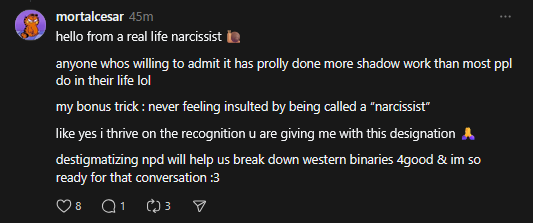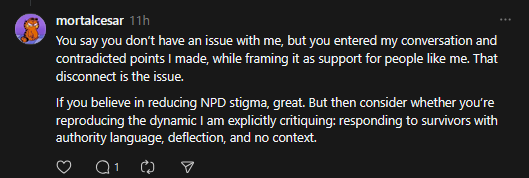
by mortalcesar with GPT
4/21/2025
There’s a curious loop happening on Threads right now—one that loops right back to the very wound it claims to heal. I’m talking about the cycle of NPD stigma, and the way its attempted undoing sometimes reinforces the very harm it hopes to dismantle.

Let’s be clear: the widespread stigmatization of Narcissistic Personality Disorder (NPD) in our culture is real.
We live in a world where “narcissist” is synonymous with “abuser,” where self-regard is seen as inherently suspect, and where having a personality disorder is often framed as a moral failing rather than a trauma adaptation.
The cultural imagination of the narcissist is cartoonishly villainized—icy, manipulative, dangerous—and people with NPD are often cast as incapable of change, empathy, or connection.
And yet.
In the rush to destigmatize the diagnosis, a second wave of harm is forming—a moral panic masquerading as care.
The cycle looks like this:
Survivors of emotional abuse share their stories online, using the best language they have. So they'll often call someone a “narcissist” because that’s the word they’ve learned to describe patterns of manipulation, gaslighting, or domination.
Instead of being met with compassion, they’re dogpiled by self-proclaimed advocates for NPD destigmatization. I see this very often in online support groups that specifically facilitate comingling between narcissists with NPD and narcissist-survivors.
Certain "language cops" tell them their word choice is ableist, without the context they need to understand that claim. They weaponize tone-policing and identity claims (“I’m neurodivergent,” “I’m a therapist,” “I’m a survivor too”) to silence the person speaking. They rarely ask what happened. They rarely listen. They just correct.
This helps no one.
Least of all people with NPD.

Because what does that survivor learn?
Not “narcissists are human.”
Not “maybe there are different kinds of narcissism.”
Not “let’s unpack this word together.”
No—what they learn is:
“Now the narcissists won’t even let me say the word narcissist.”
And so the word becomes even more volatile.
The wound deepens.
And the conversation shuts down.
As someone who lives with NPD and who is deeply invested in relational healing, I want to say: I get it. I see both sides. I’ve been both sides. And I think we can do better than this false binary.
Yes, we need to destigmatize NPD.
Yes, we need to unpack the cultural collapse between narcissism and abuse.
Yes, we need to reject the idea that people with NPD are inherently harmful or irredeemable.
But destigmatization doesn’t mean treating the word “narcissist” like a slur that no one is allowed to say.
Destigmatization means we get to say the word.
All of us.
Survivors. Diagnosed people. Curious onlookers. Frustrated siblings. Reflective narcissists.
We get to say the word—and we get to think about what it means.
That’s the only way forward. Not through forced silence, but through shared inquiry. Through shadow work. Through humor. Through missteps and mid-thread clarifications. Through people like me, saying “I am a narcissist, and I am healing, and I am also extremely funny online.”
Because here’s the twist: the people most comfortable saying “I’m a narcissist” are usually the ones who’ve done the most healing. And the people who flinch at the word the hardest? Often haven’t even begun to look.
So I say this with love and a bit of a smirk:
Let us say the fucking word.
Let survivors tell their stories.
Let people with NPD show up as whole people—not just as myths to be defended or condemned.
Healing isn’t binary. Neither is identity.
If you’re trying to defend NPD people by silencing everyone else, you’re not defending us. You’re just recreating the same cycle that made us this way.
So yeah—let us say the word. If we can't meet survivors where they're at and walk 'em up to it gently, I don't know if we're doing narcissist healing any favors.

"N Abuse" Google Doc ("N Abuse" backup)
2019 article which was widely spread to move the discourse forward about why the term "narcissist" can contribute to psychiatric harm, including alternative language. This is great for sharing once people are open to hearing more information about NPD stigma.